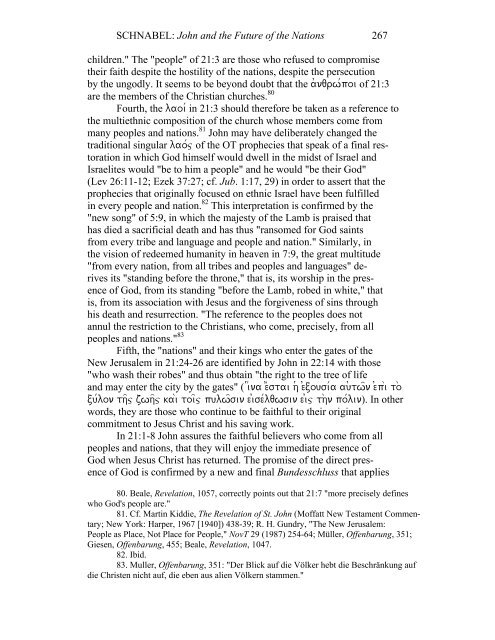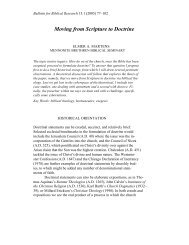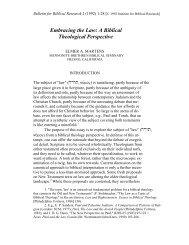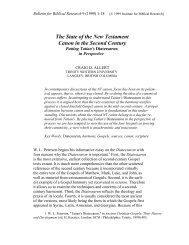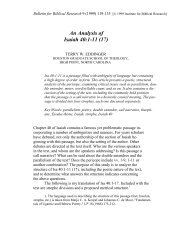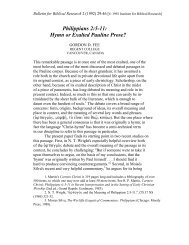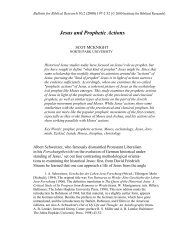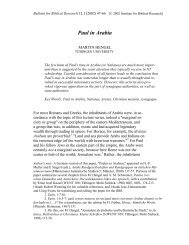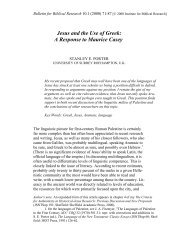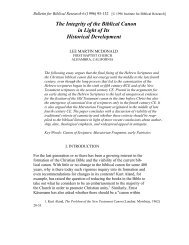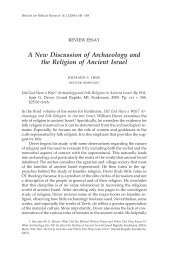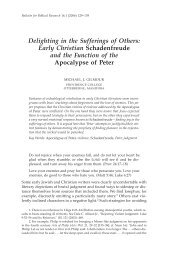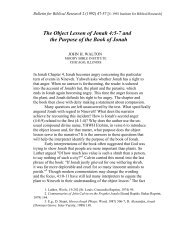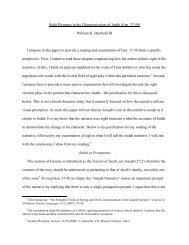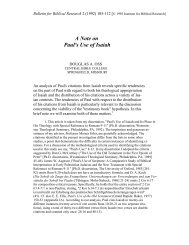John and the Future of the Nations - Institute for Biblical Research
John and the Future of the Nations - Institute for Biblical Research
John and the Future of the Nations - Institute for Biblical Research
You also want an ePaper? Increase the reach of your titles
YUMPU automatically turns print PDFs into web optimized ePapers that Google loves.
SCHNABEL: <strong>John</strong> <strong>and</strong> <strong>the</strong> <strong>Future</strong> <strong>of</strong> <strong>the</strong> <strong>Nations</strong> 267<br />
children." The "people" <strong>of</strong> 21:3 are those who refused to compromise<br />
<strong>the</strong>ir faith despite <strong>the</strong> hostility <strong>of</strong> <strong>the</strong> nations, despite <strong>the</strong> persecution<br />
by <strong>the</strong> ungodly. It seems to be beyond doubt that <strong>the</strong> a)nqrw/poi <strong>of</strong> 21:3<br />
are <strong>the</strong> members <strong>of</strong> <strong>the</strong> Christian churches. 80<br />
Fourth, <strong>the</strong> laoi/ in 21:3 should <strong>the</strong>re<strong>for</strong>e be taken as a reference to<br />
<strong>the</strong> multiethnic composition <strong>of</strong> <strong>the</strong> church whose members come from<br />
many peoples <strong>and</strong> nations. 81 <strong>John</strong> may have deliberately changed <strong>the</strong><br />
traditional singular lao/j <strong>of</strong> <strong>the</strong> OT prophecies that speak <strong>of</strong> a final restoration<br />
in which God himself would dwell in <strong>the</strong> midst <strong>of</strong> Israel <strong>and</strong><br />
Israelites would "be to him a people" <strong>and</strong> he would "be <strong>the</strong>ir God"<br />
(Lev 26:11-12; Ezek 37:27; cf. Jub. 1:17, 29) in order to assert that <strong>the</strong><br />
prophecies that originally focused on ethnic Israel have been fulfilled<br />
in every people <strong>and</strong> nation. 82 This interpretation is confirmed by <strong>the</strong><br />
"new song" <strong>of</strong> 5:9, in which <strong>the</strong> majesty <strong>of</strong> <strong>the</strong> Lamb is praised that<br />
has died a sacrificial death <strong>and</strong> has thus "ransomed <strong>for</strong> God saints<br />
from every tribe <strong>and</strong> language <strong>and</strong> people <strong>and</strong> nation." Similarly, in<br />
<strong>the</strong> vision <strong>of</strong> redeemed humanity in heaven in 7:9, <strong>the</strong> great multitude<br />
"from every nation, from all tribes <strong>and</strong> peoples <strong>and</strong> languages" derives<br />
its "st<strong>and</strong>ing be<strong>for</strong>e <strong>the</strong> throne," that is, its worship in <strong>the</strong> presence<br />
<strong>of</strong> God, from its st<strong>and</strong>ing "be<strong>for</strong>e <strong>the</strong> Lamb, robed in white," that<br />
is, from its association with Jesus <strong>and</strong> <strong>the</strong> <strong>for</strong>giveness <strong>of</strong> sins through<br />
his death <strong>and</strong> resurrection. "The reference to <strong>the</strong> peoples does not<br />
annul <strong>the</strong> restriction to <strong>the</strong> Christians, who come, precisely, from all<br />
peoples <strong>and</strong> nations." 83<br />
Fifth, <strong>the</strong> "nations" <strong>and</strong> <strong>the</strong>ir kings who enter <strong>the</strong> gates <strong>of</strong> <strong>the</strong><br />
New Jerusalem in 21:24-26 are identified by <strong>John</strong> in 22:14 with those<br />
"who wash <strong>the</strong>ir robes" <strong>and</strong> thus obtain "<strong>the</strong> right to <strong>the</strong> tree <strong>of</strong> life<br />
<strong>and</strong> may enter <strong>the</strong> city by <strong>the</strong> gates" ( i#na e!stai h( e)cousi/a au)tw=n e)pi_ to_<br />
cu/lon th=j zwh=j kai_ toi=j pulw=sin ei)se/lqwsin ei)j th_n po/lin). In o<strong>the</strong>r<br />
words, <strong>the</strong>y are those who continue to be faithful to <strong>the</strong>ir original<br />
commitment to Jesus Christ <strong>and</strong> his saving work.<br />
In 21:1-8 <strong>John</strong> assures <strong>the</strong> faithful believers who come from all<br />
peoples <strong>and</strong> nations, that <strong>the</strong>y will enjoy <strong>the</strong> immediate presence <strong>of</strong><br />
God when Jesus Christ has returned. The promise <strong>of</strong> <strong>the</strong> direct presence<br />
<strong>of</strong> God is confirmed by a new <strong>and</strong> final Bundesschluss that applies<br />
80. Beale, Revelation, 1057, correctly points out that 21:7 "more precisely defines<br />
who God's people are."<br />
81. Cf. Martin Kiddie, The Revelation <strong>of</strong> St. <strong>John</strong> (M<strong>of</strong>fatt New Testament Commentary;<br />
New York: Harper, 1967 [1940]) 438-39; R. H. Gundry, "The New Jerusalem:<br />
People as Place, Not Place <strong>for</strong> People," NovT 29 (1987) 254-64; Müller, Offenbarung, 351;<br />
Giesen, Offenbarung, 455; Beale, Revelation, 1047.<br />
82. Ibid.<br />
83. Muller, Offenbarung, 351: "Der Blick auf die Völker hebt die Beschränkung auf<br />
die Christen nicht auf, die eben aus alien Völkern stammen."


